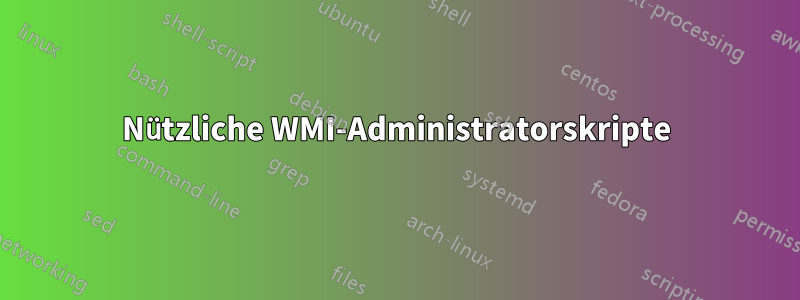
In einem Kommentar zu meiner Antwort aufdiese Fragecop1152 sagte, er liebe WMI-Skripte. Und ich auch!
Welche sind Ihre bevorzugten, besten und nützlichsten Skripte, die Sie mit der Community teilen möchten?
Danke.
Antwort1
Ich habe eine Menge WMIC-Schnipsel zusammengetragenHier.
Antwort2
Eines habe ich geschrieben, um einem Kollegen zu helfen, der per RDP auf einen Server zugegriffen hat, die Ereignisanzeige geöffnet und nach Fehlern durchsucht hat. Dann habe ich das für die anderen 3 Server wiederholt ... jeden Tag.
'
' WMI script to read all eventlog errors generated since last time this script was run.
' This script reads a datetime value from a file (EventView_date.txt) and uses it to
' construct a WMI query for all windows EventLog entries since then that are of type
' Error or error (seems winxp writes with a lowercase e)
'
' These results are written to a file (EventView_<dts>.log) and the time the script was
' run is written to the date file. This allows this script to be run several times a day
' and will only retrieve the error entries since the last run.
'
' If the date file is not present a new one will be created with the current date/time.
'
'
' Usage: click the vbs file in Windows Explorer to run using wscript. Some information
' will be displayed in message boxes (start time, each computer, number of records found)
' Alternatively type "cscript EventLogErrorView.vbs" in a command prompt to show the
' same details written to the command prompt. This can be used in a batch file, or in
' a scheduled task - the command is cscript, the parameter is this vbs file.
'
'
'
On Error Resume Next
'
' update this to refelect the computers to monitor - comma separated for multiple
'
arrComputers = Array("server1", "server2")
Const wbemFlagReturnImmediately = &h10
Const wbemFlagForwardOnly = &h20
Set objFSO = CreateObject("Scripting.FileSystemObject")
today = ""
Set objDateFile = objFSO.OpenTextFile ("EventView_date.txt")
today = objDateFile.Readline
Wscript.echo "today = " & today
if (isempty(today)) then
WScript.Echo "Date file not found, using today's date at midnight"
today = Date & " 00:00:00"
end if
today = DateToWMIDateString(today)
' write current datetime to file for next run.
set objDateFile = objFSO.CreateTextFile("EventView_date.txt")
objDateFile.WriteLine(Date & " " & Time)
Set objFile = objFSO.CreateTextFile("EventView_" & today & ".log")
' start processing
WScript.Echo "Processing All Error reports since: " & today & " (" & WMIDateStringToDate(today) & ")"
objFile.WriteLine "Processing All Error reports since: " & today & " (" & WMIDateStringToDate(today) & ")"
For Each strComputer In arrComputers
objFile.WriteLine
objFile.WriteLine
objFile.WriteLine
objFile.WriteLine "=========================================="
objFile.WriteLine "Computer: " & strComputer
objFile.WriteLine "=========================================="
WScript.Echo "Computer: " & strComputer
' notes:
' timestamp comparisons in WMI queries are in the form YYYYMMDDHHMMSS.milliseconds+exp
Set objWMIService = GetObject("winmgmts:\\" & strComputer & "\root\CIMV2")
Set colItems = objWMIService.ExecQuery("SELECT * FROM Win32_NTLogEvent WHERE (Type = 'error' OR Type= 'Error') AND TimeGenerated > '" & today & ".000000+000'", "WQL", _
wbemFlagReturnImmediately + wbemFlagForwardOnly)
dim records
records = 0
For Each objItem In colItems
objFile.WriteLine "CategoryString: " & objItem.CategoryString
objFile.WriteLine "ComputerName: " & objItem.ComputerName
strData = Join(objItem.Data, ",")
objFile.WriteLine "Data: " & strData
objFile.WriteLine "EventCode: " & objItem.EventCode
objFile.WriteLine "EventIdentifier: " & objItem.EventIdentifier
objFile.WriteLine "EventType: " & objItem.EventType
strInsertionStrings = Join(objItem.InsertionStrings, ",")
objFile.WriteLine "InsertionStrings: " & strInsertionStrings
objFile.WriteLine "Logfile: " & objItem.Logfile
objFile.WriteLine "Message: " & objItem.Message
objFile.WriteLine "SourceName: " & objItem.SourceName
objFile.WriteLine "TimeGenerated: " & WMIDateStringToDate(objItem.TimeGenerated)
objFile.WriteLine "Type: " & objItem.Type
objFile.WriteLine "User: " & objItem.User
objFile.WriteLine
objFile.WriteLine "------------------------------------------"
objFile.WriteLine
records = records + 1
Next
WScript.Echo " " & records & " records found"
objFile.WriteLine " " & records & " records found"
Next
Function WMIDateStringToDate(dtmDate)
WMIDateStringToDate = CDate(Mid(dtmDate, 5, 2) & "/" & _
Mid(dtmDate, 7, 2) & "/" & Left(dtmDate, 4) _
& " " & Mid (dtmDate, 9, 2) & ":" & Mid(dtmDate, 11, 2) & ":" & Mid(dtmDate,13, 2))
End Function
' takes a dd/mm/yyyy hh:mm:ss format and turns it into yyyymmddhhmmss
Function DateToWMIDateString(dtmDate)
DateToWMIDateString = Year(dtmDate) & PadZeros(Month(dtmDate)) & PadZeros(Day(dtmDate)) & PadZeros(Hour(dtmDate)) & PadZeros(Minute(dtmDate)) & PadZeros(Second(dtmDate))
End Function
Function PadZeros(dtmDate)
If Len(dtmDate) = 1 Then
PadZeros = "0" & dtmDate
Else
PadZeros = dtmDate
End If
End Function
Antwort3
Alles in Microsofts (kostenlosem) Tool Scriptomatic2!
Antwort4
Das Skript ist nützlich und ich kann es ausführen. Aber die Datei zeigt nur die Informationen wie
============================================ Daten: InsertionStrings:
1 records found
Darüber hinaus erstellt diese Datei („EventView_“ & today & „.log“) nur die Datei mit EventView_00.log, nicht mit dem tatsächlichen Datum. Gemäß der Syntax sollte sie stattdessen Daten von )00 liefern.


